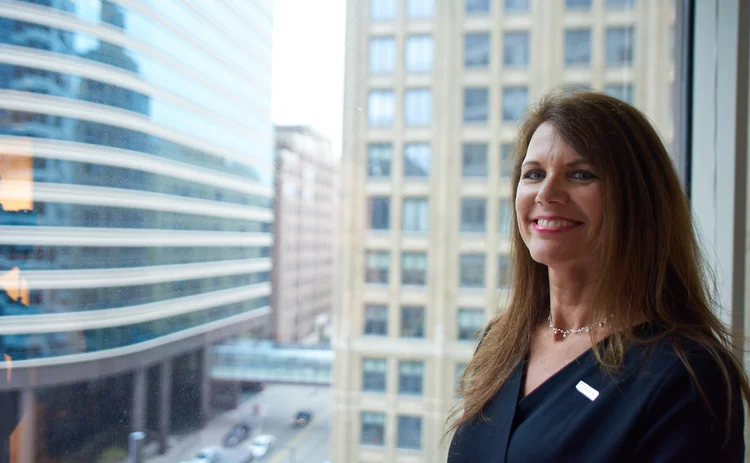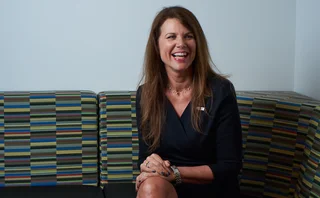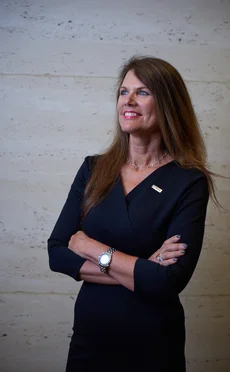Waters Cover Profile: Born to Be a Banker — Jodi Richard, chief operational risk officer, US Bank
Emilia David profiles US Bank's chief operational risk officer Jodi Richard and looks at how the bank tackles op risk and the extent to which its risk disciplines are integrated into the business.

Jodi Richard never wanted to be a stay-at-home mom. Her mother was a manager at a regional bank and she instilled a solid work ethic within Jodi from a young age. There are no free rides.
Richard went on to study finance at the University of Northern Iowa, though at first she thought she was going to be an accountant rather than a banker. She was in her senior year looking for jobs when her mother gave her a suggestion: Take an interview with the Office of the Comptroller of the Currency (OCC). That would become her first job out of college.
For Richard, the strong work ethic instilled in her by her mother who put in long hours at the bank served as a guide on how to make it in the financial world. Though her mother never got to see her appointed to the role of bank examiner—Richard’s mother died before she graduated—she remains a strong role model, Richard says.
“I never thought that I wouldn’t be working in a business environment because that’s what I learned from my mom and I had that role model to follow,” Richard says. “I feel fortunate that I was able to have her to look up to.”
Richard is now the chief operational risk officer for Minneapolis-based US Bank, where she oversees the bank’s entire operational risk department.
Preparation
Right after she graduated from college in 1990 with a bachelor of arts degree in finance, Richard joined the OCC, working specifically on retail credit loans and compliance activities. “I focused a lot on bank credit card supervision, which was a hot topic—or emerging risk—in the late 1990s and early 2000s,” Richard says.
The first six years of her professional career were spent with the OCC. In 1996 she took a job with Sears National Bank as its chief compliance officer, but that only lasted for a year before she returned to the OCC for a second stint, where she’d stay for another six years.

In 2003, she decided to leave government work—and the constant travelling she had to do—to join HSBC as director of regulatory compliance. A year later she was bumped up to senior vice president for risk governance and administration. It was at HSBC that she began working in the field of risk. She helped build out the bank’s enterprise risk management and risk governance processes. In particular, she helped lead the Basel implementation program in North America for the bank in the 2000s, giving her in-depth exposure to the world of operational risk.
She says that working at the OCC helped prepare her for the regulatory environment that the banking industry is facing today. It also helped to make her a better banker.
“All of my foundational learning about regulation and even how a bank’s balance sheet works and how it operates, I learned from the OCC. I’ve brought to my current job the understanding of liquidity management, funds management, and capital that came from core work programs that I worked on at the OCC,” Richard says. “I always say that being a bank examiner made me a better banker because I felt like I understood what their mission and goals were. Being a banker and then going back to the OCC also made me a better examiner because, having sat in the other chair, I knew it wasn’t as easy as you think it might be.”
From Credit to Op Risk
Richard would eventually become executive vice president and regional head of operational risk and control at HSBC, a position she held for five years before moving to Minneapolis-based US Bank in 2014. She says the biggest change in the move to the operational risk arena from working in compliance and retail loans is determining risk in a way that doesn’t have a fully measurable value. She was used to a more analytical and measurement-based approach.
“Operational risk is a broad field that focuses on managing the control environment. We think about what controls we have in place to mitigate the unknown and how we can avoid big, one-off events,” Richard says. “We are able to manage operational risk by understanding our risk and control environment and enhancing internal controls using process improvement and data analysis.”
At US Bank, Richard is in charge of a broad range of risk controls. She and her team manage internal and external data loss, risk and control self-assessments, business continuity and disaster recovery programs, the bank’s data protection program, fraud investigations, third-party risk management, business change and product due diligence, and the firm’s Enterprise, Governance, Risk and Compliance (EGRC) tools.
US Bank has developed a program to oversee operational risk technology. The unit is led by the technology team but works in partnership with operations. Together they look at information technology and cybersecurity issues relating to operational risk. Beyond technology, US Bank’s op risk department works closely with the numerous other divisions within the organization in order to fully understand the possible risks coming into view, Richard says.
“We’re very much integrated into the business. We were involved in evaluating the strategy of the bank and we make sure that we can stay back and examine those processes and adapt our programs to work jointly to manage that risk,” Richard says. “I think that’s why it’s important that operational risk has a seat at the table.”
Working closely with the different divisions prevents each from coming up with a siloed approach that makes problem solving and operational risk identification more difficult. Richard believes the operational risk team is there to give advice on the potential risk challenges that could arise from a new bank-developed platform, third-party partnership, or new product offering. This includes—increasingly—cybersecurity. Richard sees operational risk as an environment that is constantly changing with new emerging risks. “It’s no secret that the world is becoming more digital—from the way we connect with each other to the way we interact with our favorite stores and companies,” she says. “The work we do in risk management is becoming more important as a result. The way we use and move data, the quality of the data we rely on, and how we protect that data are all top of mind.”
She adds that the bank is looking for consistent frameworks and an intersection of historically disparate functions like anti-money laundering, operational risk, and information security to provide a more robust view of the organization and to prevent problems before they become crippling.
Staying Plugged In
Aside from keeping a close eye on the new risks that technology can usher in, Richard and her team are looking for ways to leverage these innovations in a way that helps the bank manage its data and its risk environment in a more efficient manner.

“We’re trying to stay plugged in on how we can leverage machine learning or robotics capabilities with the data we have,” she says. “There’s been a lot more use of analytical technologies in a modelled capacity in the credit space and in the fraud area, but we also want to know how we can use data to be smarter in the broader operational risk management area.”
Richard says new technologies can help enhance the bank’s capabilities, especially because innovations can help manage risk—such as fraud—in a more automated way, which is faster and more accurate than the current, mainly manual, procedures. For her, having a thorough understanding of new technologies and tools used in the risk space should be de rigueur for anyone working in that domain.
“I think risk professionals—not just in operational risk, but in all risk disciplines—need to look at new ways to manage risk, understand what those emerging risks are, and adapt risk management tools to mitigate those areas,” Richard says. She believes the risk space has undergone rapid change in the past 10 years, so it is more important than ever to stay one step ahead of emerging risks.
When she arrived at US Bank, Richard’s goal was to build out the operational risk capabilities of the organization to meet the changing business environment. She says she believes she’s met that goal. “When I came to the company, there were a few main objectives I laid out for myself and my team so we could build a strong operational risk capability in light of ‘heightened standards’ from the regulators,” Richard says. “For a company as established as US Bank, elements of risk management were managed broadly. My goal was to begin to operationalize what we did and to make sure they were consistently and sustainably managing risk under the operational risk umbrella.”
Among the things Richard implemented at US Bank were the core foundational elements for the bank’s operational risk practice. These elements included embedding operational risk management within the bank’s day-to-day business, managing risk within its risk appetite, focusing on material risks and key controls, integrating standardized operational risk tools into the enterprise risk management framework, ensuring consistent execution, and being sustainable in times of both stress and plenty.
Mentor
Richard is committed to her work, not just because she is good at it and she finds it challenging, but because she genuinely loves the operational risk space and the bank she now works for. She says US Bank’s core value of putting people first and supporting the communities it operates in appeals to her. It’s important, she explains, that she works in an organization that rewards her both personally and in a professional capacity. She doesn’t mind the long hours, but it does take time away from being with her two sons, aged 11 and 14.
Richard’s mother didn’t pressure her to go into banking, and she is similarly not pressuring her boys to follow in her footsteps. Her 14-year-old likes video games, while her younger son wants to be a rock star, so she’s letting them enjoy childhood and will save the pressure of deciding on a career for a later date.
Still, she recognizes the unique opportunity she had by having a mother who worked in the industry who encouraged her to follow a path that explores things she was interested in—like math. Not everyone has that same opportunities, and so she believes it’s important to create a network to mentor other women, to let them know that getting to the highest echelons doesn’t require superhuman efforts. And she works hard to answer questions that women in the industry ask when they meet her.
“A lot of women on my team—and even those outside of my team—reach out to me because they want to understand my career and how I got here,” she says. “One of the things they walk away with after meeting me is that it’s very real—there’s no secret sauce, everybody struggles with the same things and just wants to do a good job.
“Sometimes you see some people from afar and think, ‘Oh, there might be something special and magical about them that they get it all done,’ and then you meet them and see that they’re just like everybody else who struggles and works,” she adds.
Richard’s mother did not get to see her daughter take on her role at the OCC. She didn’t even see her daughter graduate. But that didn’t stop Richard from pursuing her mother’s legacy and working her way to a position in a bank doing something that she loves and that she finds challenging. And that really all came about because her mother asked her to take an interview with an OCC recruiter. The rest was through her hard work and genuine interest.
Fundamental Data
Name: Jodi Richard
Title: Chief operational risk officer, US Bank
Hometown: Waverly, Iowa
Age: 48
Education and Degree: BA, Business Administration and Finance, University of Northern Iowa
Hobbies/Interests: Boating, life at the lake, traveling, supporting Minnesota sports teams, advocating for women in business
Defining Moment: We spend a lot of time talking about our culture and the fact that how we do business is as important as what we do. In the past few years, we have launched a new purpose statement, a set of core values and a brand, all tied around the concept of helping people reach their potential. Working with a company that values ethics, strong leadership and putting people first has been a defining moment in my career.
Only users who have a paid subscription or are part of a corporate subscription are able to print or copy content.
To access these options, along with all other subscription benefits, please contact info@waterstechnology.com or view our subscription options here: http://subscriptions.waterstechnology.com/subscribe
You are currently unable to print this content. Please contact info@waterstechnology.com to find out more.
You are currently unable to copy this content. Please contact info@waterstechnology.com to find out more.
Copyright Infopro Digital Limited. All rights reserved.
As outlined in our terms and conditions, https://www.infopro-digital.com/terms-and-conditions/subscriptions/ (point 2.4), printing is limited to a single copy.
If you would like to purchase additional rights please email info@waterstechnology.com
Copyright Infopro Digital Limited. All rights reserved.
You may share this content using our article tools. As outlined in our terms and conditions, https://www.infopro-digital.com/terms-and-conditions/subscriptions/ (clause 2.4), an Authorised User may only make one copy of the materials for their own personal use. You must also comply with the restrictions in clause 2.5.
If you would like to purchase additional rights please email info@waterstechnology.com
More on Emerging Technologies
Waters Wavelength Ep. 313: FIS Global’s Jon Hodges
This week, Jon Hodges, head of trading and asset services for Apac at FIS Global, joins the podcast to talk about how firms in Asia-Pacific approach AI and data.
Project Condor: Inside the data exercise expanding Man Group’s universe
Voice of the CTO: The investment management firm is strategically restructuring its data and trading architecture.
BNP Paribas explores GenAI for securities services business
The bank recently released a new web app for its client portal to modernize its tech stack.
Bank of America and AI, exchanges feud with researchers, a potential EU tax on US tech, and more
The Waters Cooler: Broadridge settles repos in real time, Market Structure Partners strikes back at European exchanges, and a scandal unfolds in Boston in this week’s news roundup.
Bloomberg rolls out GenAI-powered Document Insights
The data giant’s newest generative AI tool allows analysts to query documents using a natural-language interface.
Tape bids, algorithmic trading, tariffs fallout and more
The Waters Cooler: Bloomberg integrates events data, SimCorp and TSImagine help out asset managers, and Big xyt makes good on its consolidated tape bid in this week’s news roundup.
DeepSeek success spurs banks to consider do-it-yourself AI
Chinese LLM resets price tag for in-house systems—and could also nudge banks towards open-source models.
Standard Chartered goes from spectator to player in digital asset game
The bank’s digital assets custody offering is underpinned by an open API and modular infrastructure, allowing it to potentially add a secondary back-end system provider.







